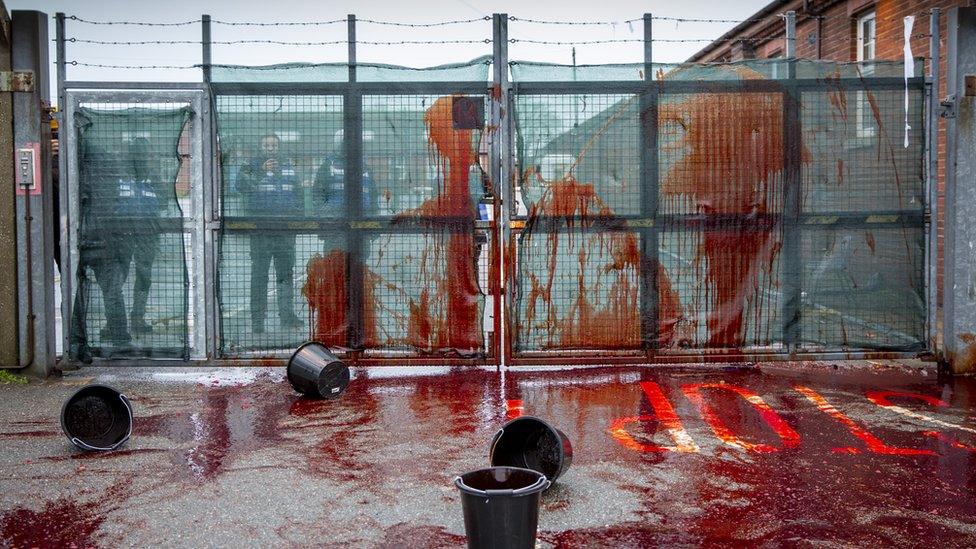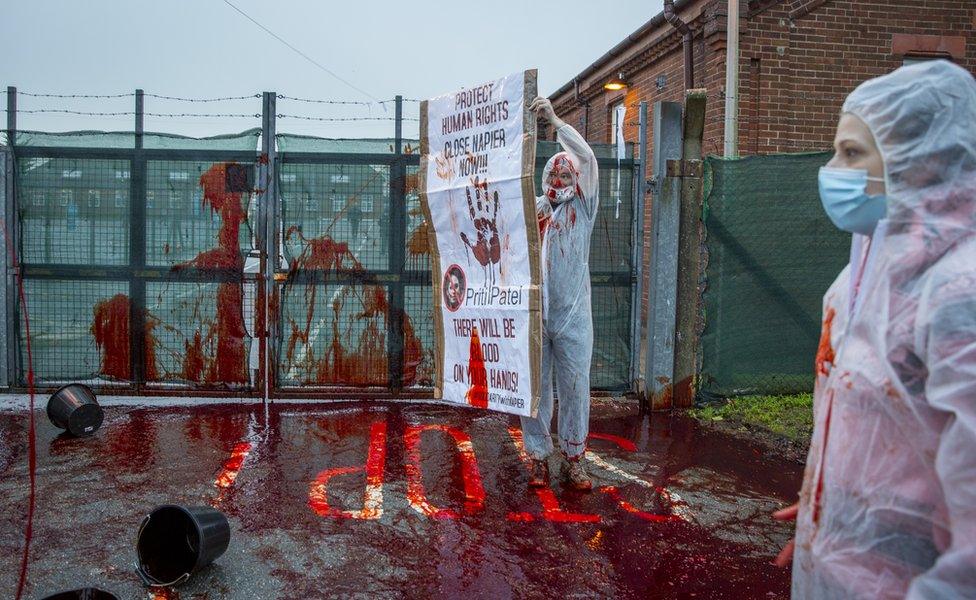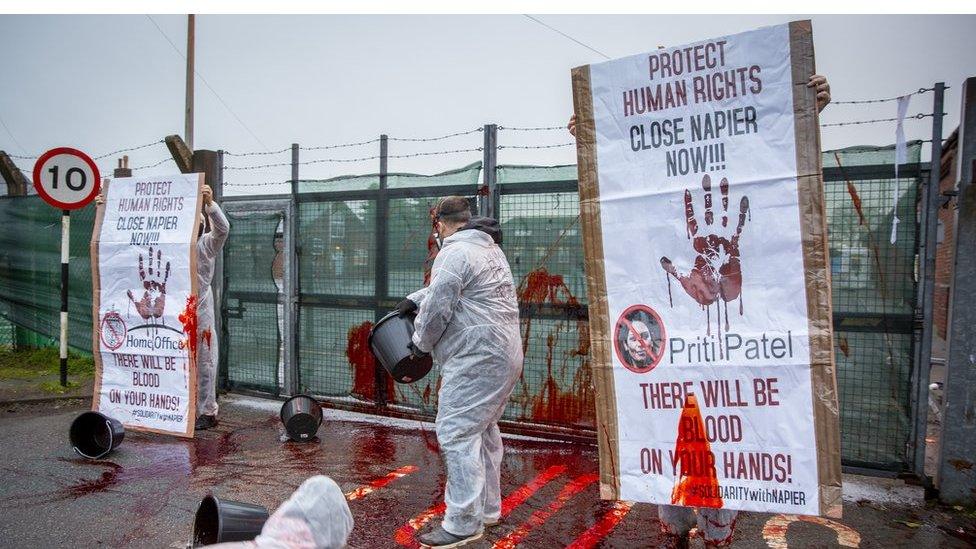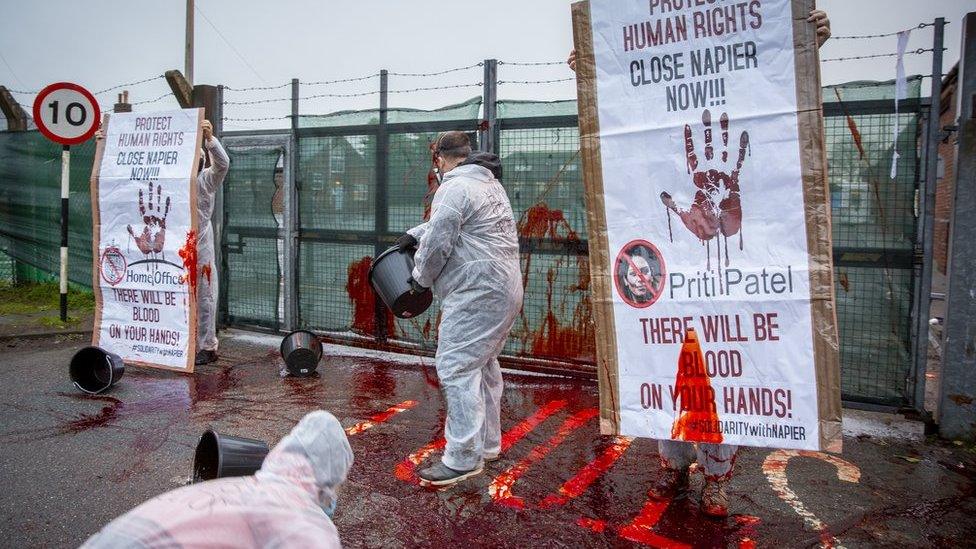Napier Barracks: Journalist seeks damages from police
- Published

The protest took place amid calls for Napier Barracks to close
A journalist who was arrested after photographing a fake blood protest at the controversial Napier Barracks asylum centre in Kent has begun civil action against the police.
Lawyers for freelance photographer Andy Aitchison have written to the force seeking damages and an apology.
They argue his arrest, detention, a search of his home and the seizure of journalistic material were unlawful.
Kent Police has not commented on the legal action.
A letter sent to the force on Thursday describes how Mr Aitchison, 46, a married father-of-two, photographed the protest before returning to home-school his children that day.
Lawyers at Bindmans have set out how officers arrested him on suspicion of criminal damage in front of his wife and children and searched the house.
The letter claims police wrongly seized journalistic material and wrongly took DNA and fingerprints.
'Intimidated and obstructed'
Solicitors Rachel Harger and Jules Carey have said that Kent Police breached Mr Aitchison's human rights to privacy and freedom of expression.
They said the arresting officer detained Mr Aitchison unlawfully because he could not reasonably have suspected a criminal offence - and another officer wrongly issued a fixed penalty notice (FPN) under coronavirus laws because he could not have reasonably believed Mr Aitchison had broken the rules.
Ms Harger said: "The arrest of our client in front of his wife and children, the search of his family home, the subsequent seizure and retention of his journalistic material and then the decision to issue an FPN constituted serious curtailments of a journalist's right to report and the right to a private family life.
"Not only has this conduct left our client feeling intimidated and obstructed from being able to report freely, there is a risk, if it goes unchallenged, it will have a chilling effect on other journalists' freedom to report on matters of public interest."

In the demo on 28 January, which took place amid calls to close the site, protesters threw buckets of fake blood at the barracks gates.
Mr Aitchison, whose legal action is supported by the National Union of Journalists (NUJ), has said he was standing in the road outside the barracks when he took the photographs.
He told the BBC he was struck by how real the blood looked and checked whether it was fake.
The protesters told him they had used a mixture of food-colouring and water, mixed with shampoo to make it "gloopy".
Mr Aitchison said it was still not known who staged the protest.
Kent Police previously said officers arrested a man following reports of criminal damage, but he was released without charge. The force said an arrest did not imply guilt.
A police spokeswoman said the man was issued with a FPN under coronavirus laws but this was rescinded after it was established he had not broken regulations.
A second person, a 36-year-old Dover man who was arrested following the protest, remains under investigation.

Inspectors raised concerns over cleanliness at both Napier and Penally camps, and said some areas were filthy
Calls to close barracks
On Friday, charities including Freedom from Torture held a "virtual lobby" event and said a petition calling for the closure of Napier Barracks had been signed by nearly 45,000 people.
Speakers including asylum seekers and MPs called for those seeking asylum to be housed in the community instead of former military sites.
They said Penally Camp in Wales was closing on Sunday and said the same should happen at Napier. Both sites were recently criticised by inspectors who found them "filthy and run-down".
A spokeswoman for the Home Office said: "Penally has provided safe and secure accommodation for asylum seekers who would otherwise be destitute."
She said temporary use of the site had provided emergency capacity in response to pressures during the coronavirus pandemic.
She added: "As those pressure have eased we have decided not to extend emergency planning permission beyond six months. Napier will remain in operation in accordance with current needs."
- Published6 February 2021

- Published4 February 2021

- Published31 January 2021
